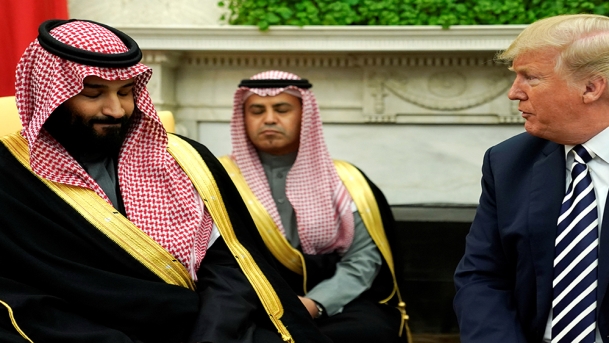
On 20 November 2018, the White House issued a statement on the assassination of Saudi journalist Jamal Khashoggi, just five days after the Saudi chief prosecutor gave a press conference laying out Saudi Arabia’s version of events—the fourth—and clearing the country’s de facto ruler, Crown Prince Mohammed bin Salman, of any involvement.
Seemingly the final word on the affair from President Trump and his administration, the statement condemned the killing while underscoring the close ties between the US and Kingdom of Saudi Arabia (KSA). As for Bin Salman (known as MBS), the statement was agnostic about any prior knowledge he may have had, saying, “Maybe he did and maybe he didn’t!”
The statement sparked angry reactions from the US press and Congress, especially in light of reports of CIA intelligence that unequivocally implicates MBS. It was also met with disappointment in Ankara, which had hoped for a firm stance from the White House.
With Trump at loggerheads with both Congressional leaders and Turkey, the final outcome of the Khashoggi affair is uncertain. Will US domestic pressure compel Trump to stop protecting MBS? Will those responsible for the assassination pay a political price?
While Turkey has been dogged in its pursuit of the case, it has a limited ability to bring political pressure to bear on KSA. It has therefore approached the affair as criminal investigation, leaving it to others—principally the US, Saudi Arabia’s closest ally—to exact a political price from KSA. In the face of intensive Saudi efforts to defuse the diplomatic crisis, Turkey has clung to three demands: the extradition of suspects in the assassination, the disclosure of who gave the order, and the whereabouts of Khashoggi’s body. In parallel with this, Turkish investigators have leaked findings, and Ankara has briefed numerous Western states, most importantly the US, disclosing its evidence while urging them to sanction the parties responsible.
As a result of this, an unprecedented consensus took shape among Western media on both sides of the Atlantic that KSA and those responsible for the assassination, however highly placed, must be punished. Actions by European states, however, were not as decisive as the full-throated condemnations they issued. Europe was most likely waiting to see the US stance before taking independent action. The White House statement of 20 November thus set the standard, and voices were increasingly heard in Europe and the US noting that all of these states have blood on their hands as well.
Has the Khashoggi case reached a dead end, then?
Saudi Arabia is working overtime at damage control, seeking to put the assassination to rest. MBS recently undertook a tour of allied Arab capitals and was conspicuously present at the G20 meeting in late November. Despite these efforts, the crisis persists as the biggest that has ever faced the kingdom. The killing has seriously eroded KSA’s moral standing and has already had tangible political costs.
At the very least, Saudi Arabia’s claim to lead the Sunni Islamic world has been severely compromised, with Turkey stepping into the breach. The assassination has also drawn attention away from Iran—KSA’s major regional foe—and its crimes in Syria in support of the Assad regime. It has also given critics of the Saudi war in Yemen an opening to pressure the kingdom and its allies to end the campaign.
It is unclear whether Ankara has hard evidence linking MBS to Khashoggi’s assassination, but US Congressional committees are already planning hearings into the crime, and there are reports of a Senate bill that would levy sanctions on those responsible for crime, including MBS. However the White House responds to these actions, it is certain that MBS, and Saudi Arabia in general, will not find the friends in Congress they once did. The prince’s reformist image has been irreparably damaged, and in the face of continued pressure from the media and Congress, Trump may be compelled to distance himself from MBS.
In KSA itself, speculation is the order of the day. Credible outlets have reported that there is movement within the Saudi ruling family to isolate and replace MBS, but no concrete action is visible. Everyone agrees, however, that any opposition to MBS will go nowhere without a green light from the US. Given the gap between the Trump administration and Congress, it is hard to predict whether the US will ultimately abandon MBS.
What is certain is that the Khashoggi assassination is still a live issue two months later. The shadow it cast over KSA continues to loom and MBS remains at its center.
**This is a summary of a policy brief originally written in Arabic, available here:
http://studies.aljazeera.net/ar/positionestimate/2018/11/181129113718010.html